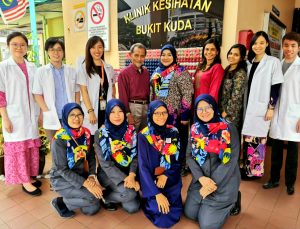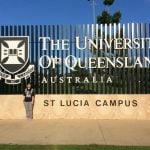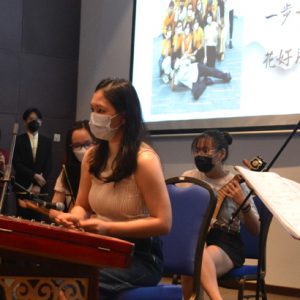The pharmacists have many opportunities in the growing healthcare industry. Apart from the Clinical Pharmacy Practice and dispensing medications, the various pharmacist-led Medication Therapy Adherence Clinics (MTACs), have given a wide-range of opportunity for pharmacists to involve in patient-focused education and counselling. Therapeutic drug monitoring service allows the pharmacists to individualise treatment for patients. The opportunity in smoking cessation clinics, is an example of how a pharmacist can extend his/her services in behavioural intervention for smoking cessation and perform the motivational interview to assist patients in quitting the smoking habit. The opportunity to contribute to peoples’ well-being is what motivates a health care professional doing a committed service in their healthcare practice.
Knowing the fact that skillful pharmacy practice will help to save many lives and improve health outcomes of patients, IMU Alumnus, Kow Chia Siang choose pharmacy as his career option. He strongly believes that an effective pharmacist has a great impact on patients’ health outcomes and pharmacy practice research has the potential to inform the best clinical practices.
| He shares his journey as a pharmacist here. |
|---|
| My journey as a Pharmacist, was really ignited in my school days. Yes, I felt that I can do so much in biology and chemistry—but once I realised these subjects are leading me to one of the most interesting healthcare professions, i.e. Pharmacy, my enthusiasm in studying human diseases and treatments gained greater interest. In fact, I gained exposure to the vital role of pharmacists, right after my school days – working as a part-time employee in a Pharmacy setting, where they dispense prescribed medications to the patients with counselling.
Since then I have joined the Bachelor of Pharmacy programme in IMU and my understanding of the pharmacy profession has deepened. IMU has presented me the chance to study, in small groups, and encouraged me to learn more by doing rather than listening. The curricula of Bachelor of Pharmacy (Hons) programme have laid a solid foundation and helped me to learn more about the various aspects of pharmacy and pharmacotherapy and gained skills through various Pharmacy Skill Development sessions. Even from the early days in the first semester until the final semester, the lecturers make sure that you are prepared, and ready to face the workforce. Through workshops, tutorials, interactive lectures, and research projects, they have provided a lot of opportunities for us to learn. Four years of study in the IMU’s School of Pharmacy have moulded me into a competent pharmacist today.
During my studies at IMU, one of the most satisfying moment in IMU is the unprecedented victory in the 2017 National Clinical Pharmacy Challenge. Our success was driven by the motivation given of the IMU’s School of Pharmacy. I could not have asked for a better experience than what I was at IMU and I so grateful for the lecturers, staff, and community.
My personal interest and passion for research prompted me to create research questions, and work on the methods to establish facts and reach new conclusions. I have shared my research findings in the form of peer-reviewed articles and presentation. I gained useful experiences in conducting research within a government healthcare setting, liaising with various government research agencies, and even presented the research findings to key stakeholders. In addition, I have also worked with researchers from the United Kingdom, especially from University of Leicester, to produce a book chapter in a pharmacy practice encyclopaedia.
Upon graduation, I was placed in an inpatient/satellite pharmacy at the Shah Alam Hospital. At this hospital, I am practicing pharmacy through the 5R concept (right patient, right drug, right dose, right route, right time) in a short time. I am screening and intervening doctor’s prescriptions for patients ranging from general medical ward to obstetrics and gynaecology ward to the paediatric ward to various intensive care units including coronary care units became my daily routine.
Besides, exposure in general medical wards provided me with a chance to perform medication reconciliation, medication, counselling, pharmaceutical care intervention, and provide advice on intravenous drug administration, working closely with doctors and nurses in a team. Subsequently, working in Bukit Kuda Health Clinic, which is a primary care clinic located in Klang, Selangor has further established my interpersonal and clinical skills.
Now that I am a fully registered pharmacist now and working in government healthcare settings, I have plans to be involved in academia so that I can share my knowledge and skills to the younger generation. In order to expand my knowledge and skills in pharmacy practice and to advance my career options further to achieve this, I returned to my alma mater to pursue a postgraduate degree, a Master in Pharmacy Practice. It is a programme that I find is unique being the first of its kind to have four areas of specialisation to choose from : Clinical Pharmacy, Social & Administrative Pharmacy, Pharmacy Management and Clinical Research. Also, this programme allows me to continue my postgraduate studies while continuing my job as a pharmacist.” |












